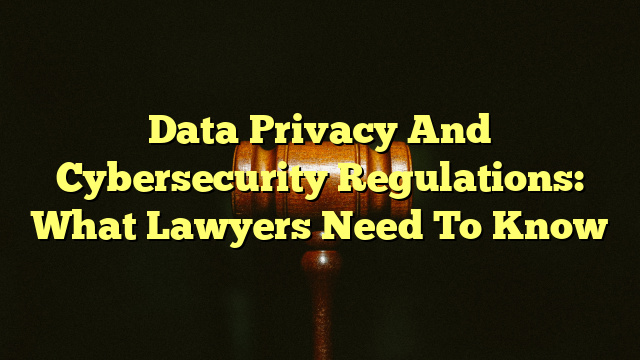Data Privacy and Cybersecurity Regulations: What Lawyers Need to Know
Table of Contents
- Introduction
- 5 Laws of Cybersecurity
- What is Data Privacy and Cybersecurity Law?
- Legal Issues in Cybersecurity
- Relevant Laws
Introduction
Data privacy and cybersecurity regulations are becoming increasingly important. With the proliferation of connected devices, the internet of things, and the growing use of personal data, the need to protect data and ensure privacy has become more pressing. As a result, governments around the world are enacting laws to protect consumers and businesses from data breaches, cyberattacks, and other security threats. Lawyers need to be aware of these laws and understand their implications, both for their clients and for themselves. This article will provide an overview of data privacy and cybersecurity law, discuss the five main laws of cybersecurity, explain the legal issues in cybersecurity, and summarize the relevant regulations.
5 Laws of Cybersecurity
The five laws of cybersecurity are a set of principles that serve as a framework for understanding the legal and ethical implications of data privacy and cybersecurity. They are:
- Data privacy law must protect the privacy of individuals, organizations, and governments.
- Data security law must protect the security of computers and networks.
- Data breach law must protect individuals, organizations, and governments against data breaches.
- Data protection law must protect the use and storage of personal data.
- Data liability law must protect individuals, organizations, and governments against liability for their data-related activities.
What is Data Privacy and Cybersecurity Law?
Data privacy and cybersecurity law is a complex and rapidly evolving field. It can be divided into two main categories: privacy law and security law. Privacy law is concerned with the protection of personal information, such as name, address, health records, and financial information. Security law is concerned with the protection of computer networks, systems, and data from unauthorized access and damage.
In general, data privacy and cybersecurity law is designed to protect individuals, organizations, and governments from data breaches, cyberattacks, and other security threats. It requires the responsible handling and protection of sensitive data, as well as the implementation of security measures to protect computer networks and systems.
Legal Issues in Cybersecurity
In addition to the five laws of cybersecurity, there are several other legal issues related to data privacy and cybersecurity. These include:
- Intellectual property issues, such as copyright, patent, and trademark protection.
- Data ownership and control issues, such as who owns customer data and who has control over it.
- Data processing and disclosure issues, such as the rights of individuals to access and control their personal data.
- Data breach issues, such as notification requirements, consumer protection, and data security.
- Data privacy and security standards, such as the General Data Protection Regulation (GDPR).
- Data protection and privacy enforcement, such as fines and other penalties for non-compliance.
- Data governance and compliance issues, such as policies and procedures for data security and privacy.
Relevant Laws
There are numerous laws and regulations related to data privacy and cybersecurity. A few of the most important ones include:
- The General Data Protection Regulation (GDPR), which sets out the rights of individuals to access and control their personal data.
- The California Consumer Privacy Act (CCPA), which provides consumers in California with specific rights related to their personal data.
- The Health Insurance Portability and Accountability Act (HIPAA), which protects the privacy of individuals’ health records.
- The Federal Information Security Management Act (FISMA), which


Cybersecurity & data privacy laws are important for lawyers to understand. Total data security solutions are also essential.